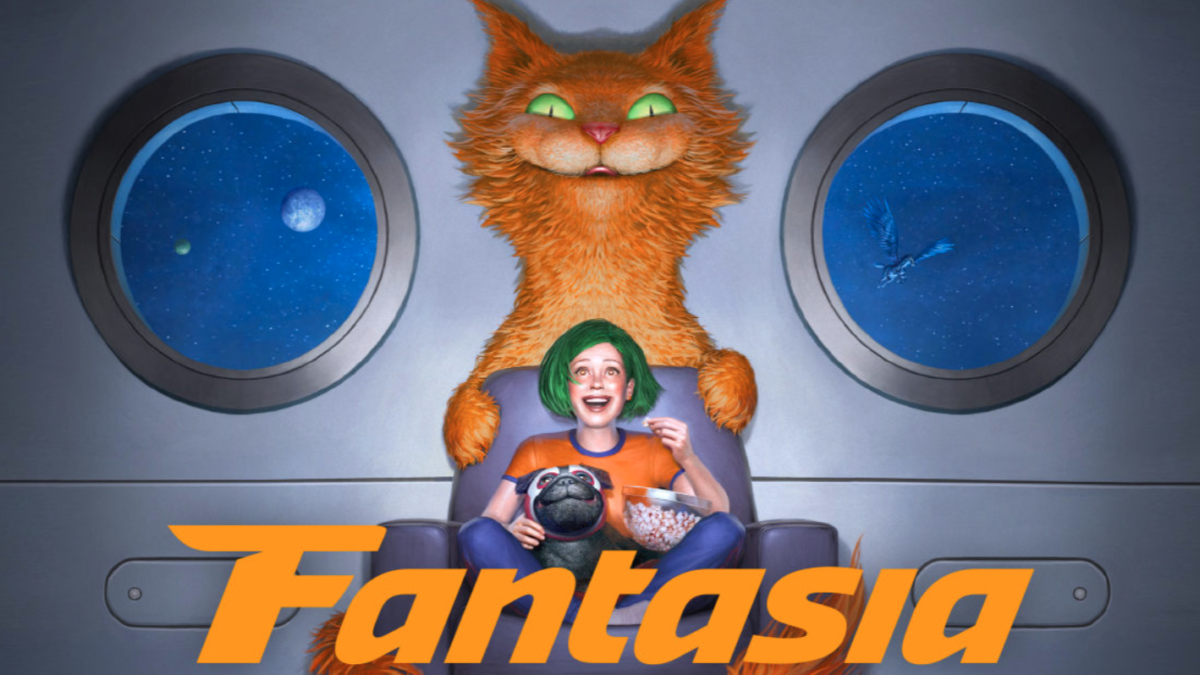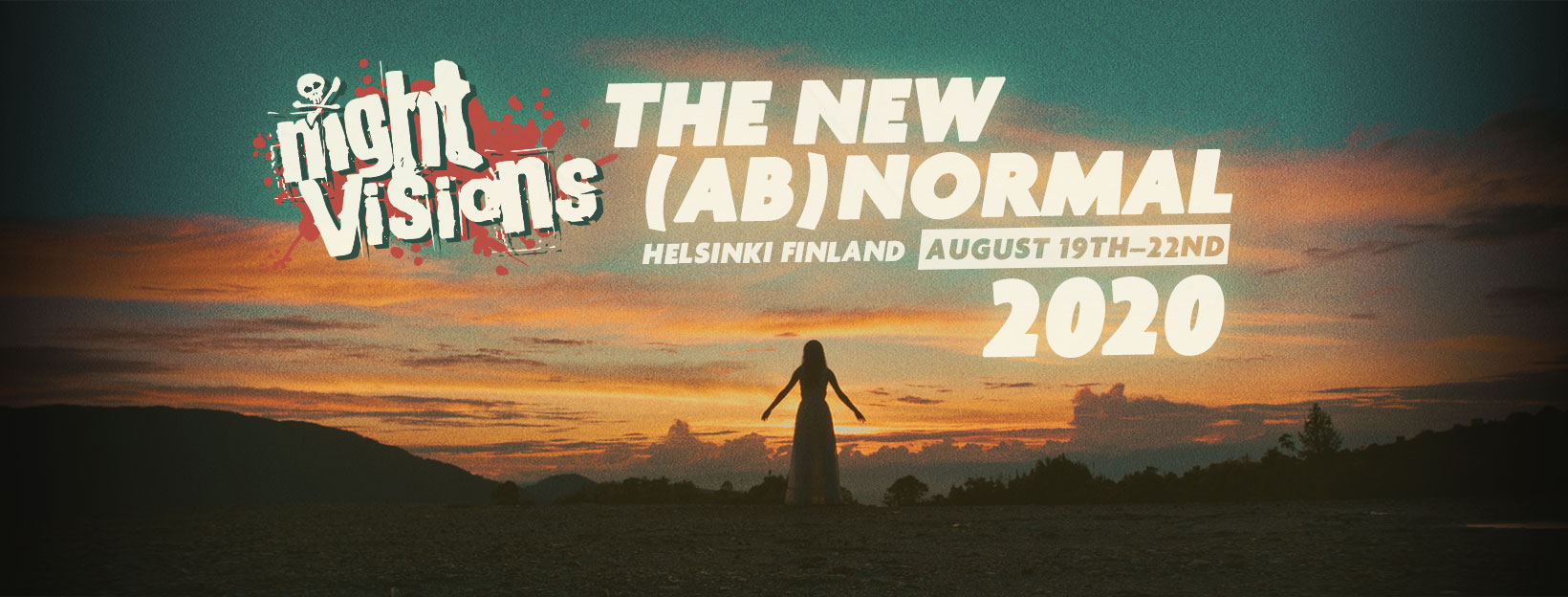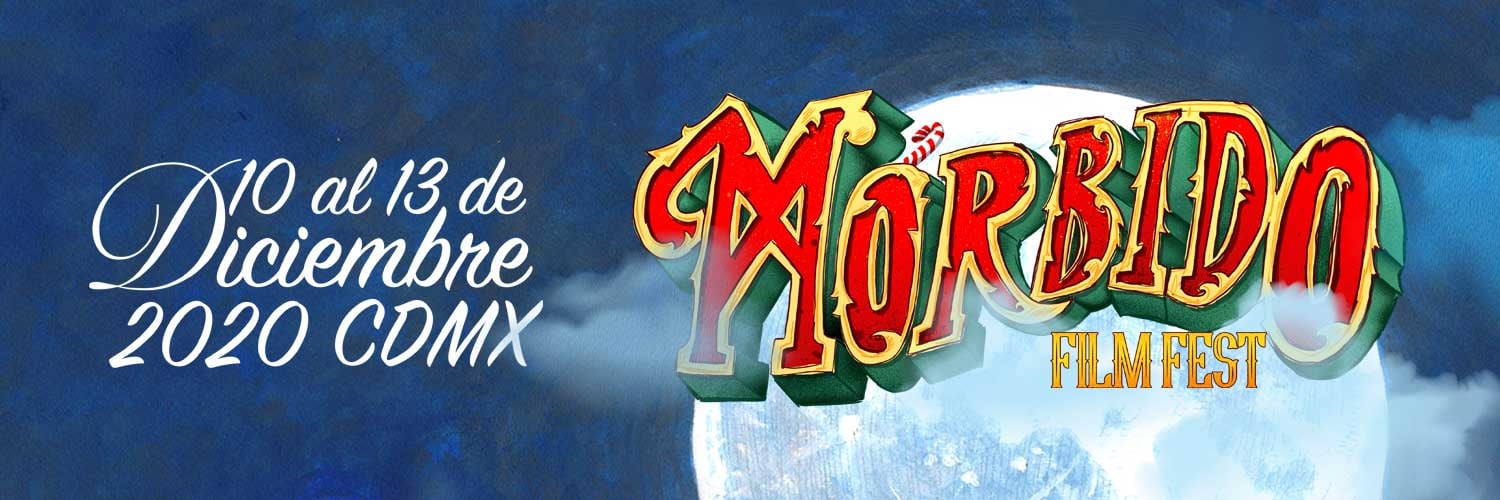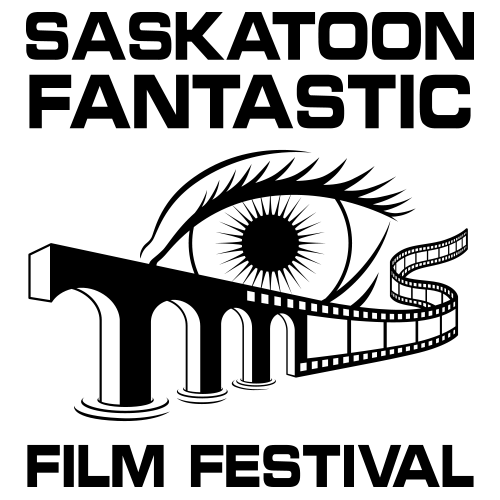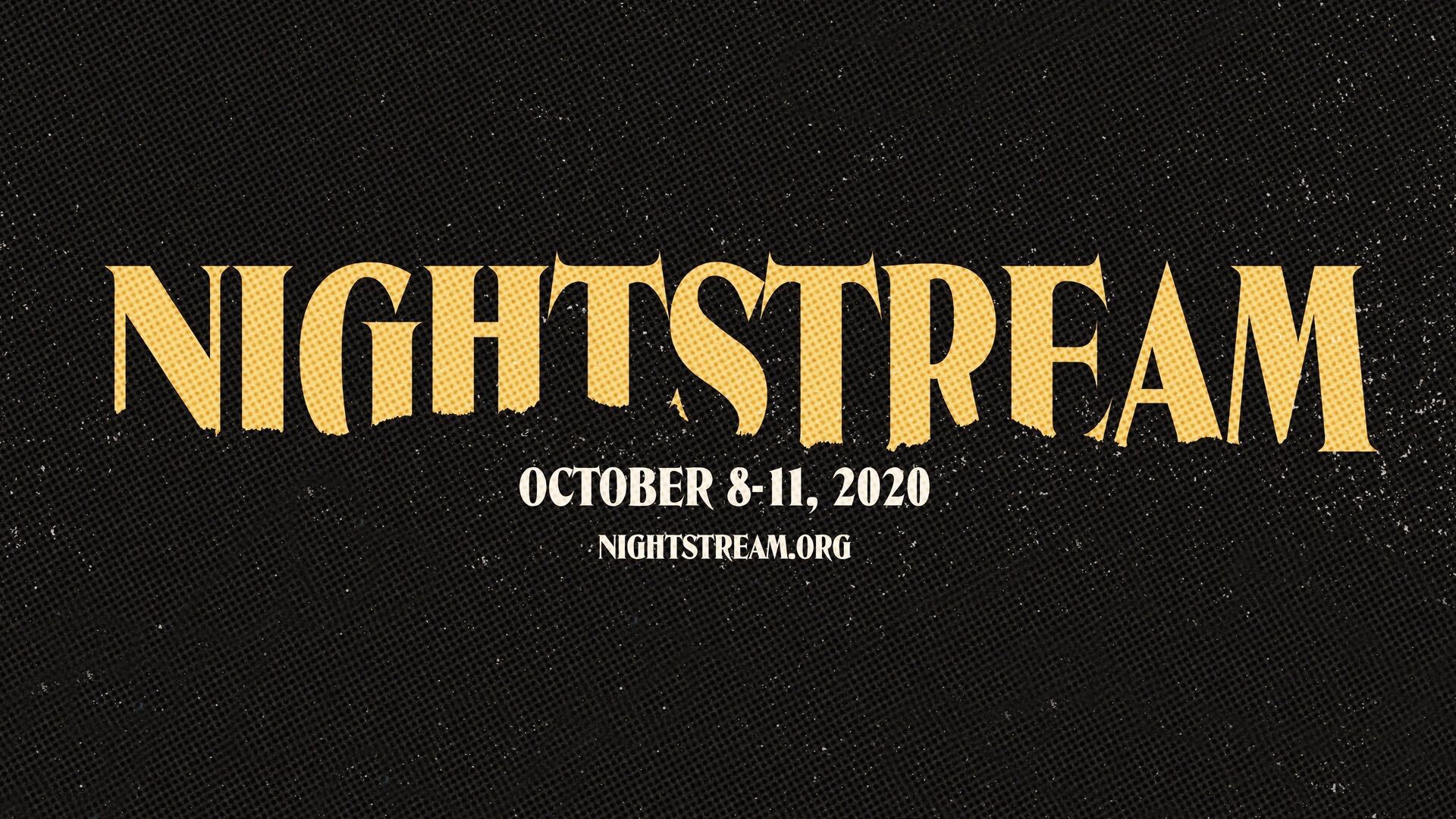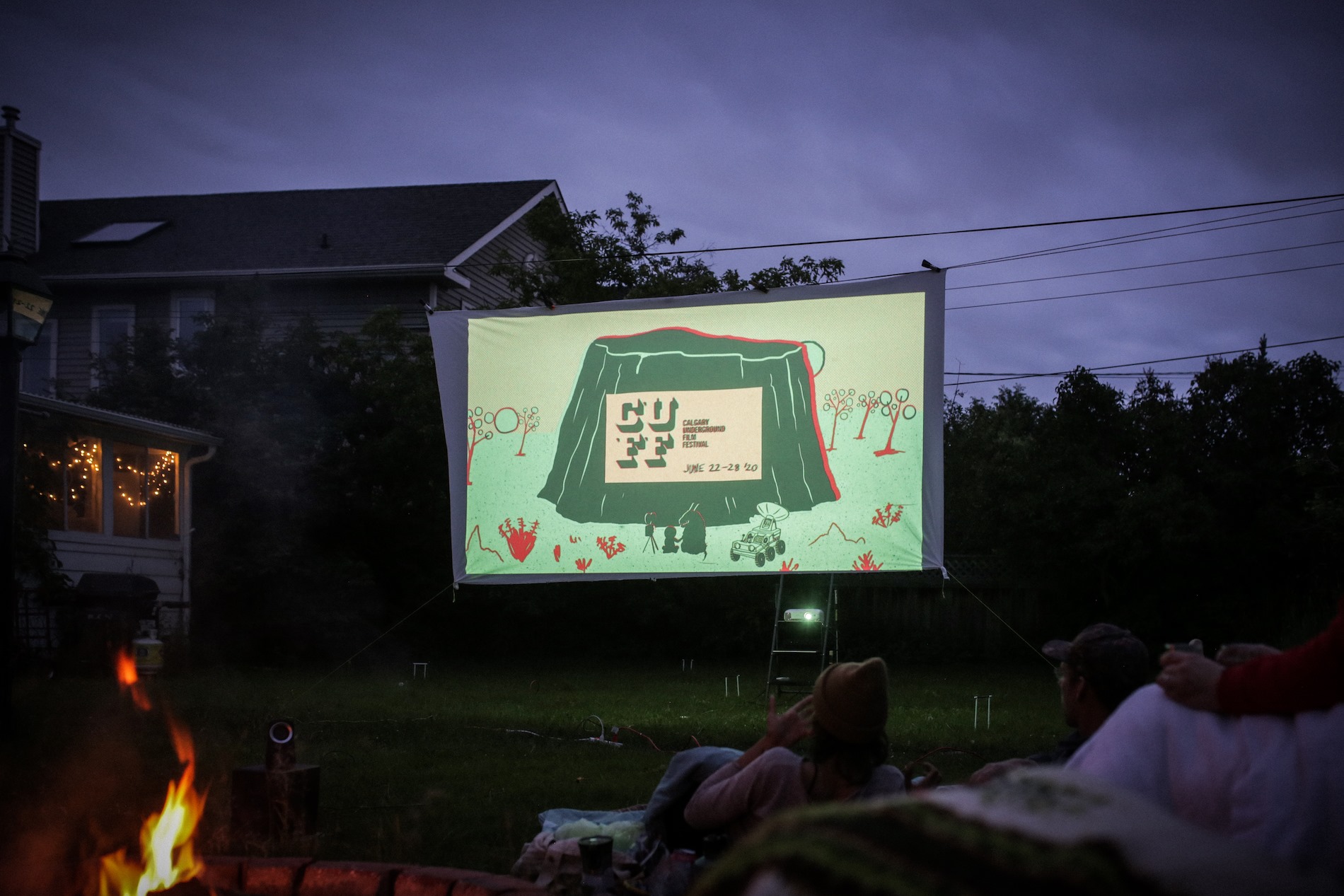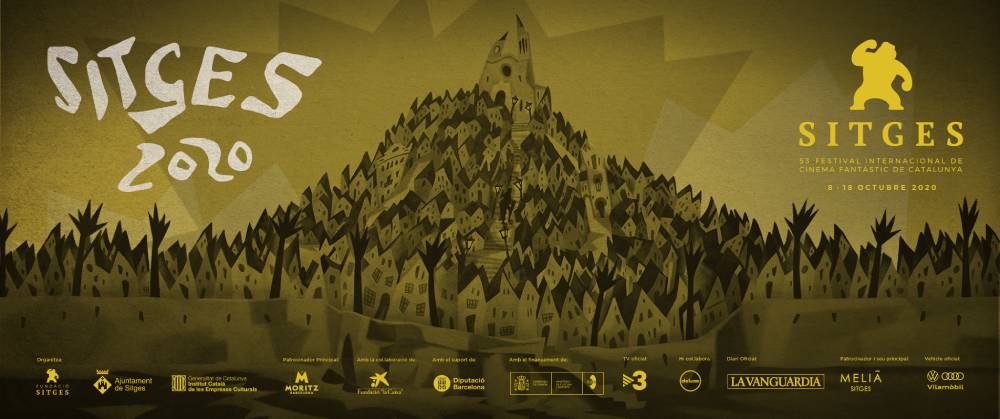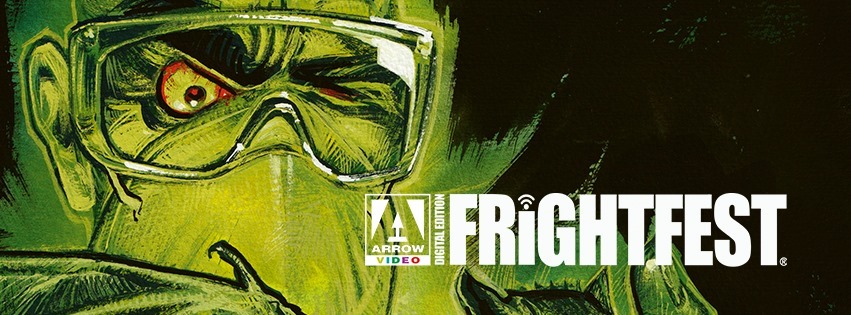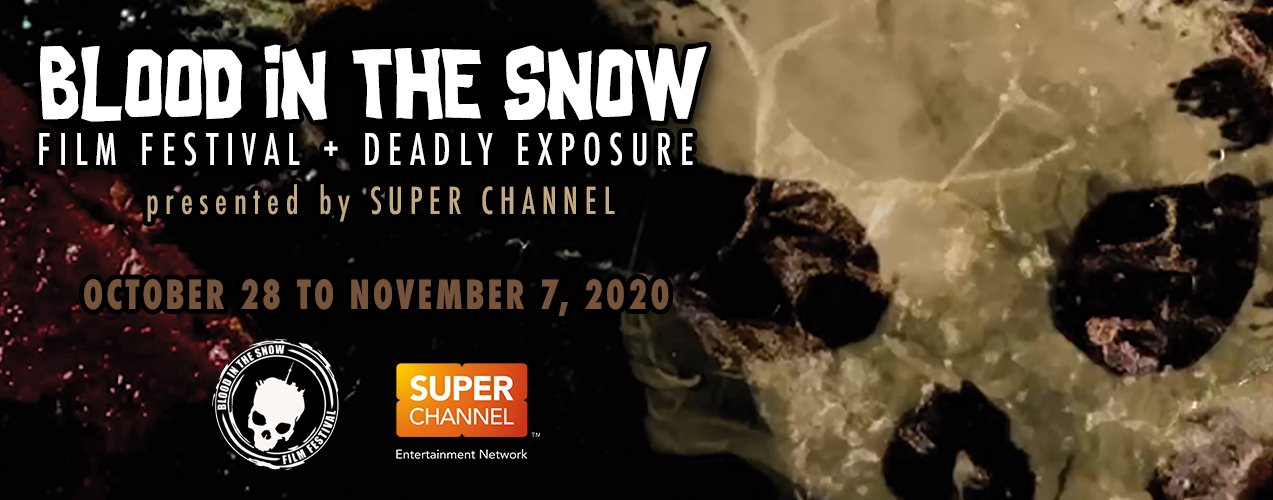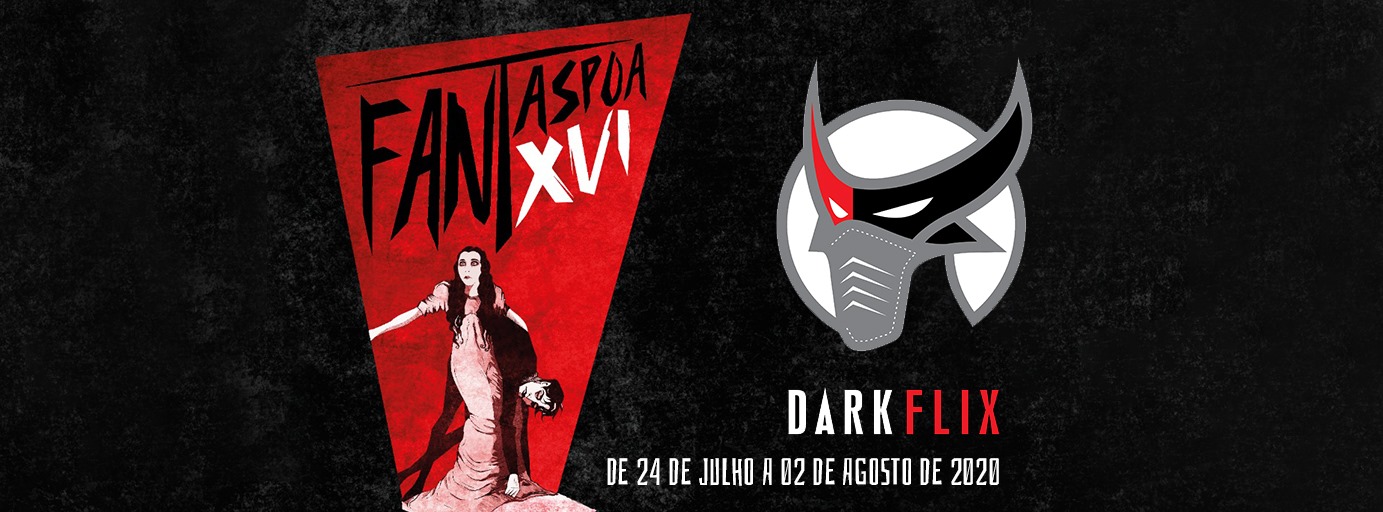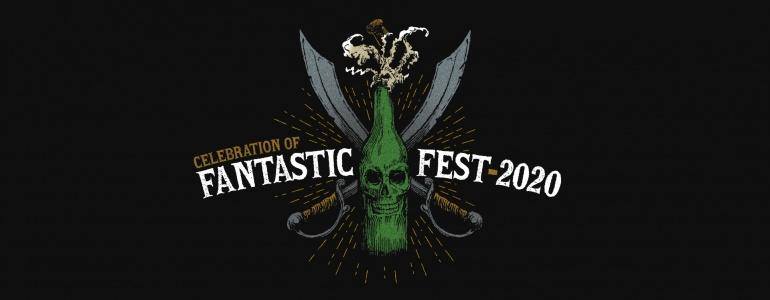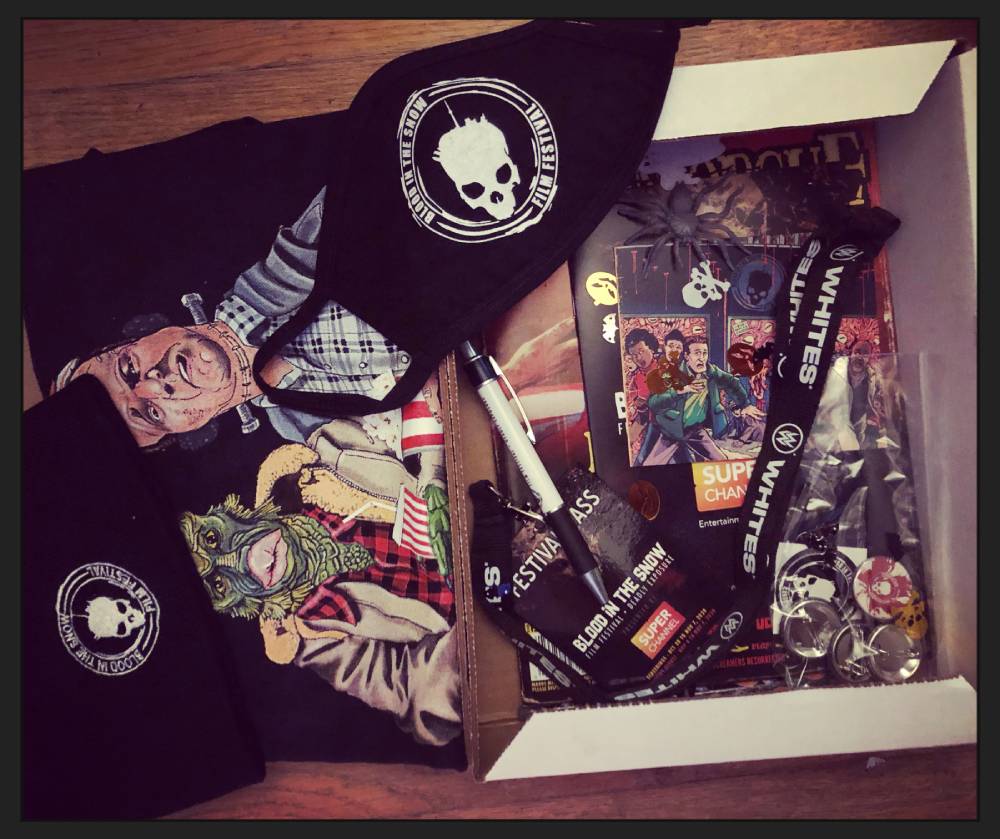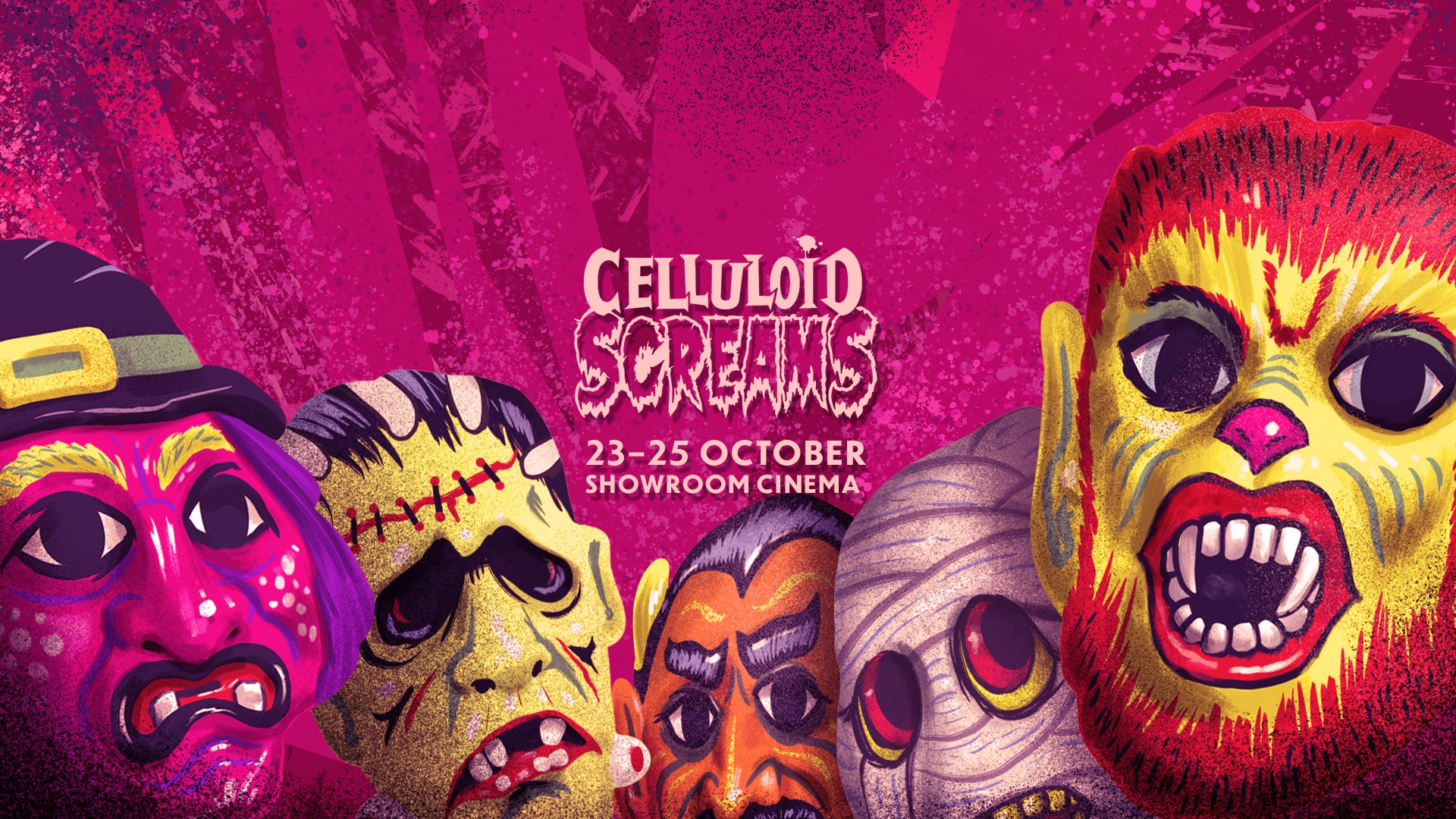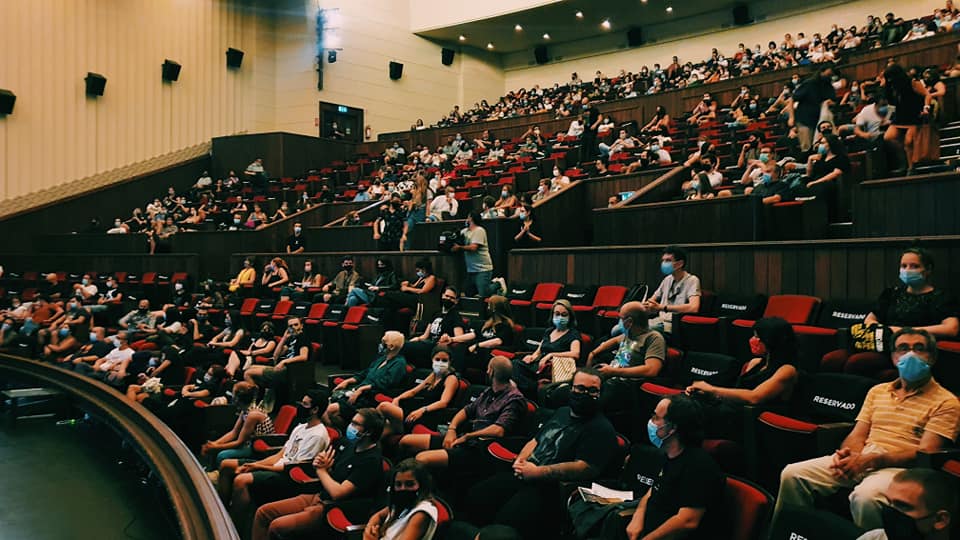The Great Festival Rebound of 2020: Chapter One - The Film Festivals


normal-thumb-80x80-80711.jpg)

















Look, I'm working with limited resources right now so this is the best themed image you're going to get for this series of articles.
What kind of festival were you able to run this year? Physical, Online, Drive-in, Hybrid?
Fantasia - Online.
MotelX - Physical
Nightstream - Online
Frightfest - We ran two online festivals.
Fantaspoa - We were able to run a 100% online edition of Fantaspoa.
Blood in the Snow - Our festival was shown on Super Channel October 28 to November 7, 2020 that was available via cable subscription as well as Amazon Prime and Apple+.
Rojo Sangre - Due to restrictions -in our country the cinemas have been closed since March- the BARS21, 2020 edition, was exclusively online.
Saskatoon Fantastic - This year's festival was an in-person only physical event that ran November 23nd-28th.
Calgary Underground/CUFF.Docs - Our June festival was a hybrid edition, running online and drive-ins. CUFF.Docs was online only.
Other Worlds - We were completely online this year! It was a mix of Eventive screenings and Zoom events.
Morbido - Hybrid Multi-Platform. All short films and interviews from shorts and features were hosted on Morbido TV (Basic pay-tv channel for all LatAm). Feature films with online screenings and screenings in a theatre for 4 days and drive-in screening for 3 days.
Celluloid Screams - Robert Nevitt (Festival Founder & Co-Director) - We were lucky enough to be able to run a physical edition this year, which given the situation seems like a miracle! While we can't be 100% sure, we're told that we're the only UK genre festival that managed a physical edition in 2020.
Women in Horror - Our 2020 fest was held February 27-29, 2020 right before everything shut down. This event went on as planned at full capacity. For many, this was the last live event attended. Our 2021 event was scheduled for February 2021, however, due to COVID-19 we were forced to move our dates. The historic theatre where we host the fest has been closed since March 2020 and is not open to the public. Between that, and it not being safe or responsible to run a live event right now, we decided to move the dates of the festival to June 10-12, 2021. If the theatre or the pandemic dictate an inability to hold a live event in June, we will be forced to go virtual.
(... continued)
Santiago Horror - This was a year of many challenges and uncertainty, both locally and globally, the blackboard was erased and we had to rewrite history, under that context we did not lower the festival and decided to do it in a mixed form, for all the public it was virtual, but we had opening and closing with live broadcasting.
At the beginning of October, where Santiago Horror is traditionally celebrated in Chile, we were in the midst of a pandemic, so unfortunately, although we had a physical location, we could not hold the festival in physical format.
Night Visions - Under normal circumstances we always organize two editions of Night Visions International Film Festival every year, one in April and one in November. In 2020, we had to postpone the April edition, but luckily enough managed to arrange it in August instead.
We were committed to running it as a 100 percent physical event, without any online or hybrid elements, because it felt like that is the only way to maintain the essence of Night Visions. It is a social event after all, and even with social distancing - which kind of comes organically for the Finnish audience anyway - we felt it was a necessity to arrange it in real cinemas.
Luckily enough, the pandemic situation in Finland towards the end of the summer was far from the worst, so eventually we managed to pull it off as a four-day event.
In addition to the August 2020 edition of the festival, on October 31 we arranged a mini-festival of four features as a collaborative effort with Helsinki's biggest independent museum Amos Rex. The museum is currently hosting a special exhibition on ancient Egypt, hence the Halloween event consisted of four features that were related to the theme of the exhibition one way or the other. The museum also has a cinema at its premises, and that happens to be one of the biggest single screen cinemas in Helsinki (currently only used for events and private arrangements). So this was an ideal location especially for accommodating the social distancing restrictions.
Then with the November 2020 edition of the festival we were not that lucky. We had already announced the full lineup and the dates, which were supposed to be from November 25 to November 28. The ticket sales started later than they normally would have; we started selling them online on Friday, November 13.
On Friday, November 20, the local health authorities announced new restrictions on all social gatherings in the Helsinki metropolitan area, reducing the maximum capacity of all film screenings to 20 people (regardless of the size and seat capacity of the screening room). These restrictions came into force on Monday, November 23, exactly two days before we were supposed to open the festival.
So we had to postpone again. Now we have new dates set for "the November 2020" edition of the festival, from January 13 to January 16, 2021. It remains to be seen if we actually get to pull it off in January.
Sitges - Our approach is to repeat the same model from the previous edition and make a hybrid edition. We firmly believe in presence as the main value of film festivals and we will prioritize the physical celebration, but the evolution of the pandemic will undoubtedly lead us to activate an online complement in many activities and screenings.
What motivated you to go ahead and have a festival in spite of the adversities?
Morbido - Simple: The Show Must Go On!!!
Blood in the Snow - We have been doing this for over 9 years now, so it would feel unnatural to not at least try and have some type of festival this year. I consider this festival my life's work now, so pushing forward is just in my nature.
Frightfest - We felt it was imperative to host an event. The emergence of the various digital platforms allowed us to proceed and not let down the community we've spent 20 years building.
Other Worlds - Honestly, in 2020 we all needed entertainment and culture more than ever! Viewers were stuck at home, filmmakers still needed support and recognition of their projects, and we as staff had the opportunity to take on this challenge. We also benefited from the time of year of our festival - by December, most festivals had taken place, and we were able to see what worked for them.
Fantasia - Two things, above all else: We’d already invited a number of films that we adored from raw submissions, and it would have been unthinkable to cancel on them, even though we figured that a few might gently back out when we’d tell them that we could only do a virtual launch for them (to our happy surprise, few did). The other was that we felt it was important for us to be there for our audience, especially during such a bleak period.
A virtual festival is no replacement for the real thing - that really can’t be stressed enough - but we felt that we could still do something that would bring a lot of happiness to people and be meaningful for the films that were involved.
It took a LOT of discussion with Festival Scope / Shift 72 to figure out interesting ways to offer the World and International Premieres in a manner that wouldn’t feel like just another passive VOD experience to the audience and industry.
What we ultimately were able to do with the platform wasn’t quite to the level that we’d been planning for, but I’m still overall happy with how things played out, for the most part.
Saskatoon Fantastic - We really wanted to provide a bit of respite from everything and give people a chance to get out of the house and do something in as safe of a way as possible. We had more restrictions in place than what the government was originally requiring. We felt it could be something safe and something special for the attendees, in addition to the filmmakers who got to attend virtually.
Women in Horror - I think the arts are needed, now, more than ever. It is crucial to continue to create and share these stories with the public. Festivals are a way for people to connect and to share their work. We have the technology to be able to do that virtually. Although not ideal, it allows us to go on with the show.
Santiago Horror - We are a young festival that has been running for three editions and has an average attendance ticket of more than 800 people per edition, something that for the size of the population in Santiago is quite (good).
I believe that our love for film and the delivery of this beautiful art to our viewers was greater than any impediment, even if it is a global pandemic.
MotelX - First of all, it's also part of our job to be creative and find ways to adapt to a new environment and fight the adversities. The festival is also a platform for promotion of genre cinema, very important to the Portuguese filmmaking community. We're also part of the Méliès Competition for best European feature and short film, a very important event for the mission of the Méliès International Festivals Federation to promote European genre cinema. We also have several partners and sponsors that we couldn’t let down and, most important of all, MOTELX's audience.
Fantaspoa - We had always had in mind that we NEEDED to do a 2020 edition. First of...well, we had considered almost 700 (paid) entries (and) had started a crowdfunding campaign, right when the pandemic started. Therefore, as we had a final selection and we've reached the crowdfunding goal, we decided to go ahead. Precisely, we realized around May that we weren't going to have a physical edition and then we decided to go for the online festival.
Celluloid Screams - POLLY ALLEN (Festival Co-director) - We realized that while the social aspect is extremely important for our audience and event as a whole, the absence of it wasn’t a deal-breaker; the appetite to see a programme of amazing new films (and simply to have something to look forward to) was evident - we received lots of messages on social media, asking if the event was still proceeding. Cinemas were still open, so there was no problem in that regard. Once we accepted the fact that people wouldn’t be able to socialize in the way that they were used to at our event, and that they were OK with that, we shifted our focus to creating an event that would run smoothly, while making sure that the audience knew what to expect at every turn.
Celluloid Screams - ROBERT NEVITT (Festival Founder & Co-Director) - As a festival, we are very community-focused and we know how much the event means to our audience. As the year unfolded we knew that this year's festival would be very different (although just how different, I don't think we fully appreciated until it happened) but we felt that it was important to at least try to proceed with a physical edition, both for the benefit of our committed and enthusiastic audience and also for our wonderful venue, The Showroom Cinema. The exhibition sector is under immense pressure and we felt it was important to support the physical experience of cinema. We also have a commitment to the genre filmmakers whose work is the backbone of what we do at Celluloid Screams and the experience of seeing the best new genre cinema (short and feature-length) on the big screen where it belongs, with a group of likeminded horror fans is really important to us.
When did hosting a festival, in whatever format you chose, become a reality?
Other Worlds - We kept our format options open for the first half of the year, but realized we could not in good conscience hold any sort of physical events as the year progressed. We started planning our virtual event in earnest in the mid-summer.
Morbido - Cancelling was never an option, but if at the end doing it digital was the only option I would have cancelled it. A 100% digital event for me, it’s not a film festival.
Frightfest - We always intended to host our events this year and manage to get our annual Scottish event in March hosted as usual before the first round of restrictions.
Saskatoon Fantastic - By mid-summer, we knew that we would go forward with an in-person screening, but we were also entirely comfortable with it canceling the event if needed.
Women in Horror - We never planned to not host our 2020 event, as, at the time, there were no mandates stating that it would be unsafe to do so. However, the reality of hosting our 2021 event is still a bit uncertain. We are moving forward as planned with a live event, but we are prepared to change that immediately if required and if it is not safe to host a live event.
Santiago Horror - Finally, in April, seeing the world panorama, we decided to carry out the festival in the hybrid format.
Blood in the Snow - We had a number of meetings with the CEO of Super Channel and we quickly figured out an agreement that worked best for everyone. Once that happened everything came together quickly.
Rojo Sangre - As soon as the pandemic began, when it was not yet clear how long the restrictions were going to last or how intense they were going to be, we discussed a lot how to continue. The decision we made for April was to think about organizing a physical festival but always considering the possibility of having to turn to a hybrid festival or, in the worst case, a purely online one. Finally, in October we had the confirmation that there would be no cinemas in December, so from then on, we went ahead with the alternative plan.
Nightstream - I would say it happened around May initially. After seeing how well things went with Chattanooga I actually reached out to some of their team to get some pointers and they being the lovely people they are bent over backwards to help me out. I initially thought we’d just cancel as virtual didn’t seem like something I wanted to explore but after speaking to them I realized it would be possible to make an event that’s still worthwhile to the films and audience. But then thought, hey we’re going to be dealing with a limited amount of films to begin with that are available virtually, and on top of that we’ll have a bunch of other fests going for the same films and selling tickets to the same audience, so I thought a team up might work best for the films, the audience and for the festivals. Figured we could mitigate virtual risks with bigger films knowing we can reach audiences in 5 cities while only putting your film online on one platform rather than 5 before you have distribution.
Celluloid Screams - ROBERT NEVITT (Festival Founder & Co-Director) - We adopted a strategy early on to continue as planned unless it became unfeasible to do so. From March onwards (at which point we'd already been programming for four months) we committed to continue working towards our physical edition as long as it was safe and feasible to deliver. With the ever-changing and developing situation, we had the constant threat of having to pull the plug if the rules set out by the UK government changed or the situation worsened at any point. So, really, hosting a physical festival only truly became a reality when it happened. The national rules changed several times in the run-up to the festival, including Sheffield moving from Tier 2 to Tier 3 measures, meaning that travel guidance and rules around alcohol and food sales changed during the festival itself (one set of rules on the first day of the festival, a different set of rules the day after). Throughout the process of putting the festival together, all we could do was adapt to the circumstances and work with our venue to deliver the best event possible, which based on audience feedback, I believe we did.
Night Visions - The cinemas reopened all across Finland on June 1, 2020, and that's when we started speculating on the new dates for "the April 2020" edition of Night Visions. Of course everyone was pretty much on their toes after the reopening, monitoring how the situation evolves. When it started to look like it won't be getting worse despite the lockdown ending, we booked the venues for August. Then we finally sent out the first press release on the subject on June 17, 2020.
Calgary Underground/CUFF.Docs - I don’t think any of us really knew how long this would go on for, and originally thought a short postponement would allow for our usual festival format to be possible. However, once we saw the whole world shifting month by month, cancelation after cancelation, and the realities of this pandemic, we knew we’d have no other option. We had previously discussed as a team how we wanted a festival, vs canceling altogether, and didn’t want to miss an opportunity to showcase the films we had already booked when we postponed the original event. We also realized that we couldn’t afford to lose a ton of money or go a year without revenue. Then we almost panicked and went into high gear, as timing was crucial for us. We made the final decision about six weeks prior to the festival date, as we knew that having a festival in a new format (online and drive-ins) would be our only option if we wanted a festival in 2020. We had a very limited window to launch our plan (staff availability, films previously booked etc), and we had already put in an insurmountable amount of work planning the April festival before we had to cancel/postpone. So we also had to factor in much of that work, and wanted to find a way to show these films in Calgary, no matter what form that took.
Sitges - From the beginning of the pandemic, we have designed a plan of affectation with different possible scenarios for the edition: from the most optimal to the worst scenario, which involved making a festival totally online. Three months before, we already designed the room protocols and continued with the hybrid plan as a viable alternative, although always considering that we could react to a worsening of the situation (which finally happened).
Our motivation was maximum since festivals were beginning to be held and we believed we could carry out ours when it was done in October. Likewise, not interrupting the festival after 53 editions was important to us: as a social and cultural return and for offering a job opportunity to the entire team.
What was the moment when you decided, okay, we can have a festival this year?
Other Worlds - We never considered NOT having a festival. Being a part of this industry, we have the privilege of knowing people, organizations, and companies that are doing great things in all aspects of film exhibition, not least in the virtual world, so we knew there would be a way to do it no matter what.
Morbido - First took the decision to push the dates, for the new normality to become less new and more normality. Then as soon as I realized I could have physical screenings we locked everything.
Blood in the Snow - As soon as we had an agreement with Super Channel, which was figured out in June 2020.
Frightfest - We had a deadline of the first week of June 2020 to have a viable program for our main five-day August event. As the deadline approached, it became apparent that a physical event was not possible due to the ever-changing rules and restrictions. We took that decision mid-June to bring the event online.
Saskatoon Fantastic - We pretty much had no intention of going online from the beginning as the festival is a community driven event. Watching movies with an audience together is why it is run, so by mid-summer, we were fully committed.
Fantasia - We were always going to have the festival, in one form or another, but fully committing to planning a virtual incarnation of the fest took us a while to come around to.
We initially postponed from mid-July to late August, hoping that it might somehow become possible to do things as a physical fest by then. At this time, the city of Montreal was planning to reopen in June, and all the summer events were waiting to see the shape of things as we got closer. We figured that going ahead with our July dates would be seriously risky, just in case things delayed by a few weeks, or if the reopening ended up being scattered across multiple periods.
So, we announced that we were pushing our dates to the end of August and then, within days of that announcement, Quebec issued a ban on large festivals and cultural events until August 31.
For about a quarter of a second, we looked at the option of postponing into the fall, but then we tried to imagine what a best case scenario might look like under that situation (never mind the fact that many were predicting a second wave to come crashing in the fall - which of course, is exactly happened, and it would have pulled the rug out from under everything we’d been planning if we’d gone that route.
The more we thought about what a physical festival would be actually like, with social distancing measures in effect, as would have needed to be the case, it just felt like it would be the most unpleasant and miserable experience for everyone. And I do mean all of us. Imagine, to have 6-feet of distancing, each member of the audience would need to have at least four empty seats on either end of them, with at least two empty rows in front and behind. How horrible a vibe would that be? Just imagining our poor venue staff and volunteer teams being stuck having to ask people to move even further away from their friends, hour after hour, day in, day out made me queasy beyond words. It really wouldn’t be fun for anyone. That’s not even getting into mandatory mask wearing, and all the pressures that would have come from enforcing that.
Most importantly, if there was still any kind of community spread happening with the virus, which we knew was surely going to be the case, it just wouldn’t be ethical to ask anyone to come to the cinema, or to flash an array of cool things that might entice people to make potentially dangerous choices because of some FOMO sense that we’ve built up. And then, on top of all that, international guests would still surely have been a total no-go in the fall, as ended up being the case.
So basically, everything that we love about film festivals would have been muffled or twisted into grim shadows of what they represent to us, and it broke our hearts to come to really accepting that.
Santiago Horror - For us and personally, as the director of the festival, we never questioned not holding a new edition, SHFF would be held with or without a pandemic, it was just like adjusting the equation and giving our best in the new edition
MotelX - In March we decided that the worst case scenario would be a special online event or an online weekend festival. That was plan C; plan B would have been a hybrid event with a couple of days of a physical event and an extended few online days. At the end of May, we knew a physical edition could happen if we'd make some adjustments, namely financially to prepare for an almost certain reduction in sponsorship and an obvious reduction of box office revenues.
Celluloid Screams - ROBERT NEVITT (Festival Founder & Co-Director) - The uncertainty caused by the pandemic meant that we had to proceed with caution. On top of our normal programming and organizational procedures, the process of putting the festival together was also impacted by the fact that our venue was closed for a considerable amount of time when the country was locked down, with most staff on furlough. Figuring out exactly how a physical festival might operate during a pandemic was the great unknown, with everything from exact numbers of available seats, venue operation and health and safety requirements to social aspects and audience interaction being up in the air. We soon realized that everything we think of as normal operating procedure had to be reimagined within the parameters of Covid. Overall, I'd say that when we were able to establish what the socially-distanced seating plans looked like and how that equated to audience numbers, that was a turning point for us deciding that the festival could go ahead.
Night Visions - Already in March, when we were forced to announce that the April edition of the festival was not going to happen as initially planned, we believed strongly that the situation was going to get better eventually. Even at that point we were stressing that we are ONLY postponing, not cancelling. Finland was never in the frontline of the pandemic in the sense that the situation would have been a total disaster over here, and the lockdown from March to the end of May improved the situation substantially.
Calgary Underground/CUFF.Docs - We had been meeting as a team trying to get a better picture of what was happening, and once we knew our whole team was 100% on board for whatever we planned, and the audience and sponsors were supportive with this too, we knew we had to commit. The major details like making sure we had the platform secured, and that we could work with our Tech Partner Binder Productions to buy and secure the drive-in gear, sealed the deal for us.
When did hosting a festival, in whatever format you chose, become a reality?
Other Worlds - We kept our format options open for the first half of the year, but realized we could not in good conscience hold any sort of physical events as the year progressed. We started planning our virtual event in earnest in the mid-summer.
Morbido - Cancelling was never an option, but if at the end doing it digital was the only option I would have cancelled it. A 100% digital event for me, it’s not a film festival.
Frightfest - We always intended to host our events this year and manage to get our annual Scottish event in March hosted as usual before the first round of restrictions.
Saskatoon Fantastic - By mid-summer, we knew that we would go forward with an in-person screening, but we were also entirely comfortable with it canceling the event if needed.
Women in Horror - We never planned to not host our 2020 event, as, at the time, there were no mandates stating that it would be unsafe to do so. However, the reality of hosting our 2021 event is still a bit uncertain. We are moving forward as planned with a live event, but we are prepared to change that immediately if required and if it is not safe to host a live event.
Fantastic Fest - It took a bit longer with Fantastic Fest, as there were concerns that the spirit of the festival was so tied-up with the community coming together in one space, but it was around late June when the festival decided to go ahead with a virtual edition - which was framed less as an authentic edition of Fantastic Fest, and instead as of a celebration of the festival and its community.
Santiago Horror - Finally, in April, seeing the world panorama, we decided to carry out the festival in the hybrid format.
Blood in the Snow - We had a number of meetings with the CEO of Super Channel and we quickly figured out an agreement that worked best for everyone. Once that happened everything came together quickly.
Toronto International - As far as I know, TIFF was always committed to having a festival in 2020, and quickly established a series of possible models and contingency plans that eventually led to the edition that transpired in September.
Rojo Sangre - As soon as the pandemic began, when it was not yet clear how long the restrictions were going to last or how intense they were going to be, we discussed a lot how to continue. The decision we made for April was to think about organizing a physical festival but always considering the possibility of having to turn to a hybrid festival or, in the worst case, a purely online one. Finally, in October we had the confirmation that there would be no cinemas in December, so from then on, we went ahead with the alternative plan.
Nightstream - I would say it happened around May initially. After seeing how well things went with Chattanooga I actually reached out to some of their team to get some pointers and they being the lovely people they are bent over backwards to help me out. I initially thought we’d just cancel as virtual didn’t seem like something I wanted to explore but after speaking to them I realized it would be possible to make an event that’s still worthwhile to the films and audience. But then thought, hey we’re going to be dealing with a limited amount of films to begin with that are available virtually, and on top of that we’ll have a bunch of other fests going for the same films and selling tickets to the same audience, so I thought a team up might work best for the films, the audience and for the festivals. Figured we could mitigate virtual risks with bigger films knowing we can reach audiences in 5 cities while only putting your film online on one platform rather than 5 before you have distribution.
Celluloid Screams - ROBERT NEVITT (Festival Founder & Co-Director) - We adopted a strategy early on to continue as planned unless it became unfeasible to do so. From March onwards (at which point we'd already been programming for four months) we committed to continue working towards our physical edition as long as it was safe and feasible to deliver. With the ever-changing and developing situation, we had the constant threat of having to pull the plug if the rules set out by the UK government changed or the situation worsened at any point. So, really, hosting a physical festival only truly became a reality when it happened. The national rules changed several times in the run-up to the festival, including Sheffield moving from Tier 2 to Tier 3 measures, meaning that travel guidance and rules around alcohol and food sales changed during the festival itself (one set of rules on the first day of the festival, a different set of rules the day after). Throughout the process of putting the festival together, all we could do was adapt to the circumstances and work with our venue to deliver the best event possible, which based on audience feedback, I believe we did.
Night Visions - The cinemas reopened all across Finland on June 1, 2020, and that's when we started speculating on the new dates for "the April 2020" edition of Night Visions. Of course everyone was pretty much on their toes after the reopening, monitoring how the situation evolves. When it started to look like it won't be getting worse despite the lockdown ending, we booked the venues for August. Then we finally sent out the first press release on the subject on June 17, 2020.
Calgary Underground/CUFF.Docs - I don’t think any of us really knew how long this would go on for, and originally thought a short postponement would allow for our usual festival format to be possible. However, once we saw the whole world shifting month by month, cancelation after cancelation, and the realities of this pandemic, we knew we’d have no other option. We had previously discussed as a team how we wanted a festival, vs canceling altogether, and didn’t want to miss an opportunity to showcase the films we had already booked when we postponed the original event. We also realized that we couldn’t afford to lose a ton of money or go a year without revenue. Then we almost panicked and went into high gear, as timing was crucial for us. We made the final decision about six weeks prior to the festival date, as we knew that having a festival in a new format (online and drive-ins) would be our only option if we wanted a festival in 2020. We had a very limited window to launch our plan (staff availability, films previously booked etc), and we had already put in an insurmountable amount of work planning the April festival before we had to cancel/postpone. So we also had to factor in much of that work, and wanted to find a way to show these films in Calgary, no matter what form that took.
If you ran a virtual festival what platform did you use? What were factors in choosing the right platform for your festival? What should other festivals consider if they decided next year to go virtual?
Morbido - We used a local platform from Cinepolis ® the main Mexican exhibitor, the platform is called Cinepolis Klic.
Other Worlds - We used Eventive, which we HIGHLY recommend. Most of the organizers come from a festival background, so they know exactly what features are key to running a successful fest. If festivals decide to go virtual again, know that simplicity is key with your viewers - have all of your films, events, ticketing, chats, etc. on one platform so that your guests don't have to juggle multiple websites or log-ins! It's best to use a platform that has multiple features.
Frightfest - We went with Eventive. We wanted to replicate our in-cinema events as far as possible. Eventive listened and went the extra mile developing a new feature in their software to allow us to do so and run our event the way we wanted too rather than fitting in with the platform's template.
Santiago Horror - One of our associated production companies was already working with a solid virtual platform, with an impeccable 1080P streaming signal and a solid infrastructure.
It was wonderful to be able to view the festival with a high quality standard, without any interruption, with the times and deadlines exactly as they were published, without a doubt we had a great job from our programming manager Martin.
I believe that festivals must see the final quality of the delivery and not despair in delivering the works to any-given platform
Rojo Sangre - We use two systems. On one hand Cont.ar, a public platform (from the Argentine State), and on the other, Flixxo, an innovative private platform. What we were looking for was for them to be platforms that allow geolocation, that have some content protection, and, finally, that they are both free for the festival and (most important) for users. In addition to these two platforms, we use YouTube for live activities (conferences, workshops, Q&A, etc.)
Nightstream - Eventive - we explored all options and the main things I was looking for was the DRM security and ability to stream on Roku/Apple.
Fantasia - We went with the platform created by Shift 72 and Festival Scope. I had a Zoom meeting with the team shortly after they pulled off CPH:DOX’s very impressive virtual edition. They were open to trying out some pretty unconventional approaches and their overall enthusiasm was very encouraging at a time when we were still not especially enthusiastic about doing anything online.
The most important things for us was to go with a platform that was already proven to be robust - we needed to know that it wasn’t going to crash under load on opening night.
Every bit as important was that it needed to have studio-grade DRM and high security protocols, along with state of the art presentation standards. We didn’t want to see 1080P masters sloppily downconverted or badly compressed.
Calgary Underground/CUFF.Docs - We chose CineSend for the main platform. We wanted to make sure we had a platform with DMR protection for the films, and could geo-restrict provincially, as this was a major decision-making factor for filmmakers and distributors we booked with. Filmmakers and Distributors were both concerned about the number of views impacting future release plans, and geo-restricting affecting other regional festivals being able to also book their films. We already had a ticketing company, so we did not need or look at the Eventive route. Shift72 looked great in the pitch, but could only do national geo-restricting. We also found many other great options, but that didn't offer the same DRM protection on films. We’re hoping that next year there are more options available. Some additional things to consider in the future are other features such as invisible watermarking. With CineSend there is some inconsistency of how the apps work vs desktop and tablet versions, which was not ideal. There are so many ways people can watch these films, and we have so little control over the user's experience if they have old gear, browsers etc, that you lose control on the complete audience experience. Teaching people how to use the online streaming tools required a lot of extra staffing, and a shift in roles to ensure that we had staff to help people 24/7 with troubleshooting.
TIFF/Fantastic Fest - Wasn't involved in the decisions as to what platform we selected and why, but both festivals used SHIFT-72.
I was really impressed by the GATHER.TOWN platform that NIGHTSTREAM used as a virtual lobby, and I would love to integrate something similar at future virtual editions of festivals that I work for.
Sitges - We have an alliance with the Marché du Film - Cannes Festival for the Fantastic 7 genre film promotion program. So we asked about your experience with Shift 72 & Festival Scope, which served as a reference.
Our main concern was to offer the maximum possible guarantees to distributors and to simulate as much as possible the projection of a festival. That is why we proposed geoblocking the Spanish territory, a limited time of access and a limited number of virtual tickets.
Our recommendation is to put the festival exhibition in its context and not choose proposals that end up being a disguised VOD distribution.
If you were able to run a physical/in house festival were you able to run at full capacity or were social distancing practices in place?
Morbido - 30% capacity
Saskatoon Fantastic - We limited our audience size to a maximum of 30 people. Initially, we started with 30 people plus any special guests as we simply wanted to provide a safe environment but just before the festival gov't restrictions came in and we were limited to 30 people maximum. Our average screening size is around 50 people per screening, with some screenings breaking 100 people. The theatre can hold 450 people.
Women in Horror - We were able to run our 2020 event at full capacity, as it was just before any lockdown, sheltering in place orders or travel bans went into effect. As a precaution we encouraged attendees to wash hands and distance when possible, and we did have hand sanitizer at multiple stations. Had this event been scheduled a week later than it was, we would not have had a live event and we would have gone virtual. Our plans for the 2021 event scheduled for June are that, if it is safe to host a live event we will do so with lots of precautions. We will limit the number of attendees so as to make it possible to sit 6 feet apart in the theatre, we will offer face masks should anyone not have one, and require that one be worn at all times during the fest. We will have hand sanitizer stations throughout the event space and we will be sure to follow any and all guidelines set forth to ensure the safety of our attendees.
Santiago Horror - The festival was a virtual and physical mix, but unfortunately without an audience, we held a grand opening with an opening band, a forum around the first Chilean horror film with its director, cast actors and a well-known nationwide TV host. It's crazy since we were national pioneers in implementing something like this, being a festival that does not have private or state resources.
The closing was also with guests by a great friend and Chilean director along with a couple of winners of local works, in the TV studio of our associate production company along with a great and incredible work team that was not seen on screen.
And with a flourish two great and well-known national bands giving an international show
Celluloid Screams - POLLY ALLEN (Festival Co-director) - We usually operate in a single screen, and weren’t able to run to the screen’s full capacity due to social distancing measures. As such, we opened up passes in a second screen, which ran an hour ahead of the other. The two screens combined still didn’t total our usual number of available seats, but it was as close as we could get. The 1 hour difference helped alleviate crowd levels as people entered and exited the screen, and there were one-way systems in place throughout the cinema. Once we got started, our festival ran largely as intended, minus the social elements, such as our opening and closing night parties. In-person film introductions from members of our team were also tricky as we had to keep our schedule running exactly to time between the two screens, so we filmed these ahead of the event. We had no in-person guests; instead, introductions and Q&As were recorded via Zoom ahead of the event, which also helped keep our schedule tight.
Night Visions - For the August 2020 edition of Night Visions, social distancing practices were in place. We were allowed to fill 50 per cent of the seats available at all screening rooms. Additionally, we decided to have a lot longer intervals between all screenings than we would normally have, just to make sure that bigger crowds did not gather in the lobby areas of the venues at critical moments. This of course resulted also in less slots in the screening schedule per each day.
What was kind of the most difficult decision to make was giving up on the all-nighter that we have always had at the end of each and every festival. We came to the conclusion that under the circumstances, the audience perhaps wouldn't have felt that comfortable with spending an entire night in a cinema, watching films back to back. And this was the first time in 23 years that we decided to skip the all-nighter.
At the mini-festival of four features at the cinema of the Amos Rex museum on October 31, the situation was the exact same with the social distancing practices. The overall pandemic situation was starting to slowly get more challenging towards the end of October, but on Halloween it was still ok to operate at 50 per cent of the total capacity of the venues.
Calgary Underground/CUFF.Docs - We have only managed to hold in-cinema events for a couple off-season screenings during October, at 25% capacity, with social distancing in place. We attempted an in-cinema hybrid model for our November CUFF.Docs and had to cancel in-cinema screenings the day before the festival started, due to new restrictions that were put in place.
Sitges - In our region there is an organism that dictates what regulations have to be imposed on all kinds of events and activities. Our festival must submit to the rules that are established for each of its actions. Last year we developed a specific program for each room and activity and in the next edition we will be forced to review it and adapt it to the new requirements. Currently, the main ones are: 50% capacity (with a maximum of 1000 people); 100% air renewal and avoid crowds at entrances and exits to the venues.
Once started, were you able to complete the festival as intended?
Sitgest - No. In the last edition we started the festival under a specific planning and protocol, which allowed us up to 70% of the capacity and unlimited screenings at night. Midway through the festival, more restrictive measures were imposed, which reduced the capacity to 50%, to eliminate the projections located after 11pm, to reduce the commercial areas, etc. It was a sudden and unexpected change, which forced a quick reaction from the organization. These are complicated circumstances that make the management of festivals even more difficult.
If you hosted a virtual festival what lessons did you learn from this experience that you would pass on to anyone else who is considering virtual heading in 2021, and what would you take into next year if you have to do it again?
Women in Horror - I would love to see the answers from other events, as we do not know if we will be required to go virtual for the 2021 event.
Blood in the Snow - Advice is hard to pass on in our case because our challenges and advantages were very specific to broadcasting on Super Channel.
Other Worlds - Community engagement has always been really important, but especially so during a virtual festival! If viewers have to watch films by themselves at home, then festivals must put double, triple the energy into planning online meet-and-greets, panel conversations with talent, Zoom parties, and the like! The draw of festivals is not just being able to watch films before anyone else.
Fantasia - One thing that should have been obvious to us and totally wasn’t was that we really should have reserved a day at the very end for repeat showings of the award-winners. With a virtual fest, we have no print traffic issues in keeping titles around for several weeks, and just about all filmmakers and sales agents surely would have agreed to have a post-prize repeat. It would have been such a great thing to offer our audience.
Another thing is that we’d likely offer more flexibility with the real-time screenings, as much as I wish that we wouldn’t, because people are just so unaccustomed to having absolute start-times with online viewings that we had issues each day where several ticket buyers simply hadn’t realized specifically when they had to watch their film - and they ended up missing it, which just sucks.
Morbido - Digital screenings are an opportunity to grow in titles and audiences. Most definitely we are going to keep this for the years to come. Something to consider too, there are some titles that we would not take for theaters but that digitally work perfectly and we can have access to more people that can’t travel to the festival.
Frightfest - To make up for lack of in-person face-to-face interaction with FrightFesters, which is year after year when we ask what brings them back, we went that extra mile to engage with them. It was not just sticking an introduction in front of and a rubbish quality zoom question and answer sessions after the films. We came up with several initiatives to involve our audiences, some working better than others, and that's what we will take forward to any other online events.
Santiago Horror - A festival for us is theater, communication, being able to directly deliver the testimony of the different industry players to our attendees, but unfortunately if this could not be the case again this 2021, only two things as recommendation, always have an ace up your sleeve and endless options.
Rojo Sangre - Regarding the movie program, I think we would make it the same way. The number of films was correct, the competitions too. We should think again about the way to develop the audience award. And regarding the special activities (the ones we hosted by YouTube), I think we should condense them. Maybe the same type of activities, but fewer activations, or with shorter duration.
Fantaspoa - We are doing it again this year... So, I'd say that the most important thing is not to give up on the festival. The world is going through a very difficult moment and nobody knows what the future of films will be like - so there's a chance that festivals will be needed more than ever. Don't give up, get your head high, strive, no matter the difficulties and do the best to offer something cool for your audience!
Sitges - We will certainly repeat the experience because circumstances have not changed and we believe that the pandemic situation will not significantly evolve in our favor.
From the lessons learned, an online platform requires dedication and a lot of promotion. You have to consider that adding these virtual rooms implies managing two kinds of festival at the same time.
What did hosting your festival in an alternate format open or close for you and your programming team? Did you have access to more or less films than previous years because you had to go with an alternate format? * Namely there was a reluctance from some studios to put their films in virtual festivals for fear of piracy.
Blood in the Snow - This format really didn't change our programming at all and we played almost exactly what we would have in person.
Other Worlds - Overall there were less films to choose from. A big factor in this was distributors choosing to release films sooner (after one or two festivals) instead of continuing the usual festival circuit. I think the worry was that the benefits of making fest rounds wouldn't be the same this year, though I'd argue that the unique circumstances of this year made for an even more active word-of-mouth presence online than usual, which is one of the biggest perks of getting films in front of festival audiences.
Fantasia - It opened our programming to the entire country, which was interesting - we’ve never spoken to rural communities in Alberta, for example - and it allowed for us to organize expansive Q&A’s that had substantially more talent participating, while allowing for much longer lengths. That opened the doors to a level of discourse and discussion that’s never really possible in a physical venue that needs to be given to the next screening.
On a similar note, the virtual format allowed us to organize daily panels and artist talks that we made available internationally - without the geoblocking that was applied to the films - so we were able to offer a ton of cool treats to the International community that was otherwise unable to join us this year, along with heaps of newcomers. That was really great, and they were super enjoyable to put together.
In terms of what we lost, pretty much all the studio films weren’t able to go with virtual Premieres and beyond that, really, we lost so much of what we love about doing festivals. I hated the idea of a filmmakers premiering their work in absentia, and for audiences to be watching at home without that beautiful sense of community and the sheer magic of having electrifying shared experiences together.
It’s for that reason that we went with real-time screenings for many of the Premieres, so that everyone could know that they’re watching together and there could still be a sense of momentum and anticipation. It also allowed for virtual Q&A’s to happen immediately afterwards so that filmmakers could be a part of their launch and hear from their work’s very first audience, which matters so, so much.
Morbido - We had less films because (of) two basic issues, we had less day and screening options and we had lesssssss budget since we had (zero) sponsors. Yes, Several distributors and producers did not want their films (on) any digital platform.
Frightfest - There was a reluctance for studios to show their films, so we lost a few. Apart from that other than the odd producer who was reluctant to include their films, we had no problems filling our schedule. By the time we got to our second online event in October, it was easier.
Women in Horror - I’ll answer this moving forward with the June 2021 event. I have not had any questions or concerns from submitters regarding their films being screened virtually, however, at this point, we are still on track for a live event, so it’s possible this issue may come up if we go virtual.
Santiago Horror - The call for works this year was at least 10% lower compared to the previous period, in general most of the works received were the culmination of a year 2019, now we will have to wait to see the 2020 phenomenon, in which the industry worldwide was stagnant.
In general, there is always the fear of piracy and this year it grew exponentially since the main festivals would be in digital format and many of the distributors or studios were somewhat reluctant to this format.
One of our greatest allies Black Mandala Films Co. once again gave us the accolade with the world avant premiere film, as did many directors who sent us and trusted our anti-piracy measures.
Rojo Sangre - We had to resign some titles that we would have liked to select, precisely because of the producers' restrictions. On the positive side, I think the great advantage happened to be able to do a festival with coverage throughout Argentina.
Nightstream - Our programming team expanded by so much since we programmed collectively with all five fests. It definitely increased the amount of films we could watch and consider and with the expanded team we could have certain people focus on certain films. Definitely unique to our situation though.
Sitges - Our plan of affectation included a system of constant monitoring of what was done in other festivals in other parts of the world, as well as legal advice from an expert in organizing events and COVID. Our idea was to select the best practices and adapt them to our reality. The festivals that preceded us addressed their situation publicly and this allowed us to choose the best path and the ideal tools for the festival model that we wanted and could carry out.
For example, the choice of the Shift 72 & Festival Scope platform was based on other festivals and the Marché du Film itself. If the international distributors bet on this technological solution, it was already a good reference for us.
Did your audience have greater or less access to your program than the standard format?
Fantasia - More or less the same.
In order to protect the films from becoming devalued (to potential distributors as well as other Canadian festivals taking place after us), we made a point of limiting the number of tickets that were available for sale to something comparable to the capacity of a large cinema space.
Of course, opening up sales country-wide, tickets were often under heightened demand, but our audience is super passionate and informed, and they’re used to getting their tickets as soon as they become available, while the rest of the country would mostly buy whenever, so it seemed to work out well in the end.
Blood in the Snow - Well more people could tune in but they were only shown twice (one for east coast prime time and one for west coast prime time). Repeat screenings were only for films that will have a broadcast deal with Super Channel.
Fantaspoa - That is a great question, with pros and cons. With each film, we were able to reach a WAY wider audience. Let's say, until 2019, with a regular screening, the biggest number of viewers we'd get for each title was below 400, due to theaters capacity.
When we moved the festival online, due to the agreement made with distributors, filmmakers and platform, each film could be seen by up to 5,000 people, so, it's over 10 times our regular capacity, so, at the same time that you can offer a good program to a significantly higher number of people, the chance of getting a film to be watched by someone who won't like it grew immensely.
So, I think that you are able to grow your fanbase a lot, offering a different kind of program, but also considering that there's a chance of people disliking it, because there are many people who ended up watching our program online that never went to a film festival.
How were your attendance numbers in virtual compared to physical festivals you've hosted prior to this year?
Other Worlds - We had less individual viewers, but those viewers were able to watch more films, since much of our programming wasn't limited to one showing/timeslot. So we're happy to say that films got as many eyes as they likely would during a physical festival.
Fantasia - Quite comparable, thankfully!
Morbido - Mixed results. We had some movies that had a better reaction digitally but for bigger movies people made clear they would have preferred a theatre.
Frightfest - Our numbers held up very well and were equivalent to normal.
Santiago Horror - Thanks to the pandemic we were able to reach many more people and places, we managed to have a growth of more than 400%, which left us very happy and satisfied.
Blood in the Snow - We don't have exact numbers of who tuned in but Super Channel has over 400,000 subscribers so even if only 1% tuned in we would have had at least 4,000 people watching which is about 1,000 more total than what we would get for our in-person festival.
Rojo Sangre - Fortunately, viewer numbers quadrupled.
Nightstream - ...we obviously reached much wider and probably had about 5x larger audience than we would have otherwise!
Fantaspoa - In the last regular edition (2019) we've had around 11,000 attendees. In 2020 online edition we have had over 66,000, so that means we've had 6 times the attendees from our previous edition.
Also, as I've mentioned in the previous question, our regular edition has a cap of less than 400 viewers per film (the one that plays in the bigger theater twice), in the online edition, we've offered 5,000 tickets for each film - only one film reached this number, so pretty much anyone who wanted to watch anything in the festival was able to.
Sitges - The virtual tickets were, as I said, limited in both access time and quantity. We always consider the online platform as a complement to physical projection. The online collection in fact has exactly met the expectations raised (10% of the box office).
If push comes to shove and you/we will have to consider hosting an alternative version of your/our festival(s), how will we be able to have sustainable film festivals in the future if we cannot ‘fill the seats’ as we did before this year with in-house festivals?
Other Worlds - A large part comes down to redefining the value inherent in buying a ticket to a film. Viewers won't get a 'seat' next to other people, but the value emerges in other ways, such as the knowledge that you're helping improve a smaller film's chances to be seen by more audiences, or the opportunity for increased engagement with the filmmaker in a more intimate (albeit virtual) setting. This redefining of film ticket value extends to sponsors, members, or any others that your festival asks money/time from. As more and more of our society moves online (it's easier and cheaper for many), we have to adjust how we approach support and enjoyment for the arts films as well.
Fantasia - If we need to be virtual for this summer, we’ll be able to do it and be sustainable as-is. The scale of the event is so different this way that even with the reduced ticket prices that we charged for last summer’s fest (we just couldn’t feel right about charging the same as we would have for a giant cinema experience), we’ll be ok. That being said, as glad as I am that we did the virtual edition, it’s really not something that any of us want to do for one second longer than we need to.
TIFF/Fantastic Fest - Festivals were honestly rarely sustainable from ticket sales alone - even before the pandemic. They often rely on corporate and government support. As budgets and revenue shrink, the number of films that a festival can support will shrink as well. TIFF and Fantastic Fest had to dramatically reduce their programming slate, and while I think they will increase in subsequent editions, I do think it will be some time before they return to their pre-pandemic sizes.
Morbido - The online experience is not the best option and does not provide the enjoyment of physical events.
Blood in the Snow - It is something I have spent a lot of time thinking about but I think it is almost impossible to know. It really could go either way in 2021, where people stay home still with Covid concerns or simply have changed viewing habits more where they won't want to go to theatres like they used to. Or the other way it go is people will be dying to get out to events again after being cooped up at home for 18 months and people will have even more of an appreciation for what festivals have to offer.
Frightfest - We don't subscribe to the notion that nothing will ever be the same again. That's just rubbish. It may take a while, but audiences will return, and life will go back to pre-covid ways. We believe a couple of years down the road numbers will have recovered back to or to near where they are now. In the meantime, festivals need to be innovative, and we plan to retain a digital component to our events going forward.
Saskatoon Fantastic - We are both lucky and cursed to be in a smaller center. Our numbers were lower than the larger festival and we have worked very hard to set up a sustainable festival with smaller numbers. As long as we are able to run and get even a smaller audience out we should be able to keep going forward. We definitely won't have any bigger guests travelling in if things continue but we will continue to screen some of the coolest movies.
Women in Horror - This is tough. As of now there are just over 10,000 festivals listed on Film Freeway, alone. Festivals being forced to go virtual does cut the cost of producing a live event, which could lead to even more virtual festivals, thus muddying the water where quality is concerned. It might also force some events to close their doors for good. It’s really hard to say what the outcome will be. I think to have sustainability with virtual platforms, creating an atmosphere that feels exclusive and offering online events that are one-of-a-kind while also creating spaces that allow attendees to network and socialize virtually. A lot of this will be trial and error, and it will be different for each event, depending on their individual goals. We’re in a bit of uncharted territory.
Santiago Horror - As I was saying, you always have to have more than one option simultaneously, to finally know which way to go.
Now, until you have a definitive vaccine for COVID, visualizing a full room is a long way off.
MotelX - The only way is to cut costs, including showing less films. As we move more and more online, the revenues will always be much smaller because so much more content is so readily available.
Rojo Sangre - That is "the" great challenge. Although doing the festival online allowed us to lower many costs, there are expenses that cannot be avoided. On the other hand, the lack of rooms prevented us from having two of our usual sources of resources: the sale of tickets and the sale of merchandise. To try to compensate for that, we made an online store where the public could buy some of the usual merchandising and even symbolic tickets. But an online store, in addition to not having the usual circulation that exists in the lobby of our cinema, has costs for us (commissions to platforms) and for customers (shipping costs) that further reduce profit margins. In other words, an exclusively online festival is not sustainable in the long term.
Nightstream - Tough to say, I think there will likely be an element of virtual that sticks around but we’ll see how things go.
Fantaspoa - That's a very tricky question. In Brazil, we relied for about 10 years on sponsorships that we managed to earn from edition 5 until 15. In 2020 we worked only with the entries (and) crowdfunding. For 2021, we are trying to get a sponsor, but most likely, we'll have to rely only on the entry fees, because we don't feel that we could have ticket sales for an online event in Brazil.
Celluloid Screams - ROBERT NEVITT (Festival Founder & Co-Director) - Based on our experiences this year, it is possible to stage a physical film festival during a pandemic (never thought I'd ever have to write that sentence!) and if we have to do it again, we will. I would hope that by the middle of 2021 the situation will have improved to the level that things will be closer to a normal festival experience. When the pandemic first hit, we considered all of our options for Celluloid Screams (including pivoting to digital) but after gauging the mood of many distributors and sales agents, we knew that moving to a virtual platform would most likely have an impact on the breadth and diversity of our programming. Early on in our programming phase we already had a number of key titles that we'd set our hearts on, and by committing to a physical festival we managed to secure them. Sustainability for the future is a real concern, not only from the point of view of festivals, but the venues that host them. While most people have understandably been watching films at home as their main or only option during 2020, I'd hope that necessity doesn't become simply a matter of convenience when things return to normal. Cinemas and festivals will need our support post-pandemic in order to survive and there's a real danger that the big-screen theatrical experience could be lost if we don't.
Night Visions - In all honesty, we have actively not thought about the alternatives. When your bread and butter is an event that is committed to building audience engagement mainly in a cinema environment, it is extremely hard to think of a valid alternative to it all. Setting up an online platform for showcasing new (genre) cinema under the Night Visions brand is of course an option, but it would still need to be considered secondary to the physical festival. Anything taking place 100 per cent in the online world is nothing but a mere shadow of the physical festival experience, and we don't really see a way of replacing the physical festival with something like that. Not even temporarily.
Of course this should not be interpreted as offending by anyone who has successfully hosted an online festival in 2020. Some great things have also happened online all across the world under the bizarre new abnormal of 2020, and we don't see anyone having made those efforts voluntarily. It is great that selected festivals have found a way to adapt successfully. But that still hasn't changed our minds about it.
Calgary Underground/CUFF.Docs - This is an extremely important topic, and one that festival organizers need to think about. Yes, we would do online for another year, and yes, we know hybrid festivals are likely here to stay. BUT this is not a very sustainable model. The drive-ins, and streaming are both so expensive in terms of platforms, upload costs, streaming costs, tech team support, artist fees, website upgrades etc. Revenue also decreases as ticket prices are typically for a household or watch party, rather than each person buying a ticket as we are traditionally used to. So how do we balance this? Right now, we’re relying more heavily on donations with each purchase than we used to.
Sitges - We must be moderately optimistic and get used to the idea that we still have a year of uncertainty left with the ups and downs of the pandemic. I do not believe that this is a definitive situation but rather that a transition must be conceived and know how to combine this concept in house without disappointing the usual public with the facilities of online tools to achieve international participation.
For this type of event where the experience of a live screening is part of the equation to enjoyment of the film you're watching, how were you able to provide value to the online experience of your attendees? Did you charge for the tickets for the event? And, even if you didn’t, what did you offer to them to choose your virtual festival amidst a myriad of online films and events offered online?
Fantasia - ...we also set up a Fantasia Discord, where the audience, filmmakers, press and industry were able to hang out as a virtual bar of sorts. This was before the joy that is Gather was upon us (it’s incredible how fast things are moving on the tech end right now), which we’ll almost certainly use if we’re virtual again this summer. Nightstream really invented the model with that one!
Frightfest - We charged for tickets, albeit at a reduced rate. There are costs to hosting online events which need to be covered, so it's unrealistic to just because it's online to do it for free.
Santiago Horror - This format allowed us to extend the programming both in quantity, quality and time, therefore, the viewer who visited us had a large billboard, with many premieres, world news, in addition to having interesting guests where each viewer could interact with them, talks and workshops where each visitor could live the experience. And all this from the comfort of home
Fantaspoa - We did not charge tickets for the online edition of the festival. We don't think that is something that would work in a country like Brazil.
As for the offering. In our case, I think that the quality of the films that a festival such as Fantaspoa brings, speaks for itself, so our main offering was the films itself. In the U.S. and Europe, you have a number of festivals. In Latin America and, precisely, in Brazil, only (we) have a program such as ours. But we managed to do about 20+ Q&A's with filmmakers which were also interesting. All in all, we were able to have a major turnout!
Calgary Underground/CUFF.Docs - Live Q&As with filmmakers were a key component of our live online events. We also have DJ live streams, and interactive chat functions to keep the audience engaged and connected.
TIFF/Fantastic Fest - Arguably that you're able to watch the film at home is value unto itself, since you can invite friends and family (hopefully those you have bubbled with during this pandemic) to watch the film for the price of one "ticket". TIFF and Fantastic Fest did try to preserve certain festival traditions, such as exclusive Q&As with the filmmaker, albeit they were pre-recorded, and therefore questions were not taken from the audience. However for Midnight Madness, I reached out to TIFF Midnight alumni to show up during the Q&As as a surprise and ask the filmmaker a question. I feel like that added the kind of spontaneity audiences enjoy during a traditional Q&A.
Furthermore, Fantastic Fest actually decided not to charge a ticket fee for most of its screenings; instead treating its "Celebration of Fantastic Fest" edition as a gift to both the filmmakers and the festival community, rather than a revenue generator.
Sitges - Our festival was held largely in physical form, so we had national and international guests, who were able to reach Sitges with special permits.
Regarding the online platform, we include presentations by the directors and pre-recorded Q&A to complete the offer of the film itself.
The selection of films by Sitges already supposes an exceptional curation of the best fantastic cinema. Being able to access these premieres is already an incentive in itself. In addition, virtual tickets were somewhat cheaper than physical ones.
If you ran a festival that was virtual or had social distancing restrictions in place, how or what did you do to create anything related to the physical festival experience? (ie. social events, gatherings, retention of programming that happens outside of the film schedule)
Santiago Horror - We always have as a philosophy, to have parallel activities during the exhibitions, perhaps they may think that this affects attendance, but on the contrary it makes the public to have rest and recreation during the festival. If you don't like the billboard at that time, we give you the opportunity to do some fun and entertaining task during the day.
MotelX - We kept our open air screenings and live performances during our Warm-Up days running as usual, but with distanced seating. We held a few masterclasses and Q&A’s with national guests and a live streamed Q&A with Takashi Miike directly from Japan. We also reorganized our outdoor MOTELX Market with clear entry and exit signs, restricting the number of people allowed to circulate at the same time, and frequent cleaning of common work spaces. We extended the festival week by two days and that helped us enormously to maintain a somewhat regular festival while allowing for more time in between screenings and events and avoid big gatherings.
Blood in the Snow - One thing that we did which was a huge success was that we sold merch online as custom "BITS Boxes" but what made it extra special is we still printed our full colour program booklet and made souvenir festival pass badges that we gave free with each box and also sent to all the filmmakers playing the festival.
Rojo Sangre - What we did, in addition to showing movies, was having a daily live broadcast on YouTube. In addition to the usual Q&A with directors, live interviews with figures like Lloyd Kaufman, FX workshops, and other cinematographic trades, we had moments of exchange with the audience, with live podcasts and moviegoers late nights with the active participation of the audience. It is not the same, of course, but at some point those encounters with the festival audience allowed us to emulate that moment, at the end of each show, where we meet at the door of the cinema to talk about the movie we have just seen.
Nighstream - Our events were included in the badge. Since we had resources from the five festivals we were able to put on a lot of events in addition to the films and I think a lot of them were very much highlights of the fest. Especially the use of Gather for our parties :)
Celluloid Screams - ROBERT NEVITT (Festival Founder & Co-Director) - The social aspect of our festival was the hardest hit. Anyone who has attended Celluloid Screams in the past knows how important social events such as our opening and closing night parties are to the DNA of the festival. Our traditional closing night karaoke party is now the stuff of legend, but this obviously had to be cancelled for this year, so we're looking forward to bringing that back with a vengeance when it's safe to do so. Socializing in general is a huge part of what we do, and over the last thirteen years we've built a fantastic community of fans and filmmakers that's often referred to as a horror family, so operating a festival with that element dialed back was tough. That said, those who did attend this year told us that they were still able to have discussions between films and spend time together in a socially-distant manner and some people attending for the first time remarked on how they were able to meet new friends and will be returning in 2021, so it goes to show that you can't keep a good horror fest community down!
Night Visions - At the August 2020 edition of the festival, we did also host a synthwave themed festival club with three live acts. This was kind of a "companion piece" to us including the synthwave documentary The Rise of the Synths in the official selection of the August edition. Social distancing restrictions were also in place at the venue where the club took place, which of course translates to it not having been as wild as it would have been under normal circumstances. But it was definitely worth doing despite the smaller number of people attending.
Another element that was contributing substantially to the genuine festival experience in August was one of our locations which accommodates two screening rooms, a restaurant and a bar with a large outdoor terrace. The outdoor terrace provided the festival goers with an opportunity to hang out "at the festival premises" safely outdoors, also taking into account the social distancing restrictions.
We also had all our merchandise sales at that particular location. So even though we were not arranging any special "events" there in addition to the screenings at two different screening rooms, this became very organically the "center" of that particular edition of the festival.
It needs to be pointed out that had the festival taken place in April as initially planned, the weather in Helsinki most definitely would not have been as kind to us as it was in August. So we most likely would have lost most of what we managed to gain through the weather having been absolutely amazing during the festival in August.
Calgary Underground/CUFF.Docs - Chat boxes during live events helped to create the social aspect that typically takes place during the festival. We also hosted a Zoom chat on the final day of the fest to allow fans to connect with festival staff and speak about their festival highlights. Social media content (mostly on instagram stories), also allowed us to share user-generated content about how people were experiencing CUFF from home.
TIFF/Fantastic Fest - I think live-broadcasts and live-chatting is actually key for any content that consolidates a cult film audience. It may be antithetical to the idea that audiences need to give films their FULL ATTENTION, but I think that a contemporary viewer's media literacy has gotten to a point where it's easy for them to keep up with a film, while also actively interacting with the audience watching it. I also think a lot of filmmakers actually do appreciate seeing a chat react to a movie in real-time. It's almost as validating as a room of applause. Almost.
In tandem with that, I think virtual lobbies like the kind that are made on platforms like GATHER.TOWN go a long way to creating the atmosphere and energy of a film festival. The appeal of festivals is the spontaneity of a live event, and the audience you watch it with, so whatever you can do to foster that sense of community and spontaneity should be encouraged.
For the Drive-In screenings at TIFF, I tried to add a William Castle-style element by having a monster stalk the cars. You gotta find ways to make the experience feel distinct from other forms of entertainment. If an audience can get what you're offering elsewhere, then there's a risk that you'll lose them to those other platforms.
Sitges - In our case, the physical format included meetings, presentations, Q&A, etc., as it has always been, although complying with current restrictions: social distance, outdoor events, capacity limitation, etc. There was not a big difference in that aspect to ensure the value of attending a festival. International participation was both physical and online, live or recorded depending on the type of guest and the event itself. The truth is that we carried out a lot of preliminary work to ensure that each film was accompanied in one way or another by those responsible.
Post-festival one of our contemporaries announced an impressive number of international journalists covered the festival, from the comfort of their own homes, a larger number than ever before BECAUSE the necessary move to digital this year gave access to any journalist with good bandwidth wherever they were in the World.
First of all, how would you define your press coverage? Local (in the city). Regional (in the province/state/etc). National (in the country). International (uh… everywhere else).
MotelX - National, and growing internationally.
Other Worlds - Local and national press outlets are most common for our news coverage.
Fantasia - Absolutely. That was a major plus. (Local) solid (Regional) and (National) good (International) Beyond terrific
Morbido - This year we (purposely focused on promoting) only the local world premieres and their directors. We did not push to have wide press coverage. If next year restrictions and hybrid formats continue (it) will be a different story.
Blood in the Snow - Being a Canadian only festival our press coverage tends to be all Canadian of course with the majority of it from the Toronto area.
Women in Horror - Our press coverage is pretty good, mostly local and National. We have a good amount of local press attend in person, with some National outlets attending when travel is possible. Our press numbers have increased with each year, 2020 was our third event since launching in 2017. It’s possible that we won’t see many traveling from out of state to cover the 2021 event, so we will do our best to make any necessary accommodations so that the films and the event can receive the press coverage they deserve.
Santiago Horror - We are grateful from the heart to all those alternative and underground media that started believing in us and supporting us, on the other hand, the coverage of fantastic festivals and terror in Chile by mass media in general is very poor, and we insist that we only rescue the independent media and more than anything specialized, I think it is generalized throughout the world in this way
Rojo Sangre - Mainstream press coverage was frankly less than in other years. This had several reasons: on the one hand, the impossibility of doing certain activities that normally had a good impact (opening screening, press cocktail, journalists' conferences with directors, etc.). Also, many film festivals of other themes that took place during the year in our city, postponed their realization to December, overlapping with our date. That generated a lot of dispersion in the film press. We noticed a growth in the independent press: blogs, radio or podcasts specialized in genre films. It is something that we have to work on in the future, probably also thinking about specialized foreign media.
Nightstream - We usually allow press access remotely anyway so I’m not sure there was a huge uptick because of it being online. I think we may have received less regional coverage actually because usually we have local TV stations and journalists interviews with filmmakers but not as much this year but it was very unique to still have bits of the regional coverage just spread in 5 cities.
Night Visions - That is a BROAD question and a bit of a tough one to answer thoroughly. Having been around for 23 years, Night Visions is an entity recognized and covered by both local and national media every time it takes place. Coverage depends on the lineup of each and every festival and partially also on the international filmmaker guests that come over to Helsinki for the festival.
The number of stories published on each edition of the festival varies a little from edition to edition, with the current (national) mainstream media landscape being somewhat picky on subjects relating to culture, including film. So if "National Mainstream Media A" covers the April edition of the festival, then they might not end up covering the November edition of the festival - unless both editions are also featuring international filmmaker guests that the outlet considers "big" enough.
Especially over the past five years or so, we have also managed to get some substantial international coverage for the festival, mostly published ahead of the festival. Among the international outlets that have been covering the festival lately, we need to bring up at least ScreenAnarchy, TerrorWeekend.com and Screen International. The UK based Screen International, the biggest European outlet for industry professionals, has published news pieces on Night Visions several times over the past couple of years, which needs to be brought up, because there are really no mainstream film festivals in Finland that would have been covered by them to any extent.
Out of the international recognition in the media, it also needs to be brought up that Night Visions is the only film festival in Scandinavia that has made it three times in a row to MovieMaker Magazine's listing of world's best genre film festivals (in 2019, 2020 and 2021).
TIFF/Fantastic Fest - I can't speak for TIFF's Communications department, nor Fantastic Fests' for that matter. I am simply not involved in that aspect of the festival. However, TIFF definitely gets a lot of local, national and International coverage, while Fantastic gets both local, national and the general genre blog-o-sphere.
I will say that for TIFF Midnight Madness, I did personally reach out to press that weren't able to get accredited and connected them with the respective publicists for the Midnight films.
Sitges - Without a doubt, digital access opens a world of possibilities. However, I believe it is necessary to preserve the presence. There is an essential part of meeting and interacting with people that only occurs in physical format.
Perhaps we should think that according to what audiences such as journalists it is important to have more quantity, but in others we must prioritize the quality of their interactions so that the festival fulfills its mission in the best possible way.
Second, how were your press numbers compared to previous years, how did the pandemic affect that?
Other Worlds - Press numbers were quite comparable to previous in-person years, as virtual film screening is often a help instead of hindrance to journalists seeking to write about specific films.
Fantasia - Most definitely. We had a record amount of media coverage, with 475 accredited journalists from around the world.
Morbido - Since we have our own platform/tv channel, radio show and social media (5.5 million followers) we get the promotion we intended for the exact people we wanted to.
Frightfest - We achieved a record amount of International, UK and local coverage in print and online. Coverage has never been a problem for us. Our late summer August bank holiday date is a significant plus. It's the UK summer silly season, and the media has fewer stories to cover.
Santiago Horror - Fortunately, at SHFF, we are having more and more national relevance, whether through open TV or radio stations. A pandemic did not affect this item.
Blood in the Snow - They were about the same as we had in 2019 which was over 200 press hits.
MotelX - The numbers were actually very good considering everything. There were other film festivals happening more or less at the same time, as well as other cultural events that were postponed to September, so there was less space available on the press for each but the media was very interested in covering events that could make it happen in this context.
Celluloid Screams - ROBERT NEVITT (Festival Founder & Co-Director) - The press coverage of our 2020 edition was smaller than usual, but we did have some good pre-festival coverage from a number of online outlets, which we were very grateful for. The pandemic meant that we were unable to welcome any members of the press in person as we normally would, which was caused partly by a lack of physical spaces to offer (all of our festival passes were allocated to our public audience, and sold out within 15 minutes of going on sale) and also difficulties around travel. We're committed to expanding our press coverage in 2021 and would encourage press outlets to get in touch with us to attend.
Night Visions - The coverage of the August 2020 edition of the festival in local and national media was not dramatically different from what it would have been in a normal year. We got a slight advantage out of having been the first post-lockdown film festival in the Helsinki metropolitan area, plus the only film festival in the region during the summer of 2020 - as others would follow only in September, i.e. NOT during the summer.
Of course what we ended up missing were a couple of interviews that would have been published, ahd we been able to invite international filmmaker guests to Helsinki. But sadly the travel restrictions prevented us from doing that.
Would you be open to more online press coverage for future editions?
Other Worlds - Of course! It's a great way to engage with local audiences and reach out to untapped potential viewers.
Fantasia - Absolutely, whenever possible. On a related note, industry involvement was very strong as well. A good number of our Premieres were acquired during or just after the fest.
Frightfest - Of course.
Santiago Horror - We are waiting for you with the doors open to all your doubts and alliances.
MotelX - Yes absolutely, especially if we go for a hybrid version or online festival
Blood in the Snow - We are always open to more online press coverage.
Night Visions - In principle yes. However, providing press with online screeners is always a bit of a double-edged sword, as the films we have in the official selection would all in principle deserve to be seen on the big screen. So the entire screening link business from the reviews perspective is always a bit of a so-so.
Also another challenge in relation to this and the international press willing to cover the festival has to do with the international sales agents of some of the features in our selection. So for instance if and when we are hosting an international premiere of a Scandinavian film that has not premiered anywhere else but in its home country prior to the international premiere at Night Visions, it can turn out to be impossible to convince the company responsible for the international sales of the film to provide a screening link for anyone in the international press. And of course it is most definitely not only the Scandinavian films that can potentially turn out to be a challenge from this perspective. Which on one hand is totally understandable, also taking into account how many of the online film festivals of 2020 have been geo-blocked.
Calgary Underground/CUFF.Docs - Our press coverage increased dramatically for the 2020 edition of the festival. It was very much an anomaly for coverage, and we set a new record for the overall number of media hits. Coverage was up by 47% from 2019 with a total of 119 media hits across TV, radio, and web. The main differences that accounted for the increase for the online festival were:
Local: our local media partner CJSW Radio did a significant number of filmmaker interviews, with nearly every available feature filmmaker being booked on a show. Usually we focus these radio interviews for guests that are in town for the festival, but with more filmmakers available from home and the radio station doing all interviews by phone, they were able to accommodate more guests.
National: we worked with a number of new blogs on film reviews, providing screener links in advance. With fewer releases of new films, the bloggers had more time to cover festivals.
International: we didn’t receive much international coverage, as we remain a smaller local festival.
Overall, media seemed interested in general arts coverage / good news stories in a cycle that was dominated by COVID-19 and Black Lives Matter
Sitges - We have grown in all levels of press coverage and we are pleasantly surprised. Our concern to guarantee maximum security and the geoblocking of the screenings has limited us a greater participation of the international press, but they have also echoed the festival. The quality of the programming and the epic of the edition under these difficult circumstances has undoubtedly added greater notoriety.
Is there anything else you would like to mention about hosting a festival that I have not addressed above?
Frightfest - There is nothing to beat the anticipation that we and our audiences feel each year as we all gather in central London on the Thursday afternoon before the late summer bank holiday weekend ahead of our traditional 6 pm start time. It's the end of months of work for us and for the audience, it's the end of a journey sometimes from distant parts of the world for five days of a special communal experience that brings people together year after year. There's something special about sitting down with seven or eight hundred other people as the lights go down and an image appears on a giant screen. That can't be replicated online. Hopefully, sooner than later we will be able to look back on a challenging year, perhaps even with a little fondness, okay maybe not, and appreciate what we have.
Morbido - NO, JUST THAT WE MISSED YOU A LOT!!! (Editor's Note: This is entirely self-serving but I needed to read it)
Saskatoon Fantastic - This year's fest was both amazing and a bit sad at times. We had a great lineup of films that we couldn't share with everyone and we missed seeing a tonne of the regular attendees out. Those who did come out expressed how it was a meaningful experience to them whether they were a filmmaker who got to see (through zoom) people in a theatre watching their movie or the actual attendees who got to share an experience of being one of the few in-person festivals in the world.
Santiago Horror - Just thank you Andrew and ScreenAnarchy, for the Santiago Horror tribune and from now on to all who can read us tell them that this is their home in Chile and do not hesitate to knock on the door, here we will be waiting for you.
MotelX - Despite the restrictions in place, we kept the MOTELX spirit during the festival, which was an atmosphere we were afraid to lose this year. Our audience was very excited to attend the screenings, and gladly followed the rules and understood the changes that had to be made. Also, September proved to be the right time of the year to keep holding the festival - our programming remained recent and relevant, with a cycle on racism and horror cinema, a new special programme on experimental horror cinema, and events with performative arts that joined literature, hip hop, and theatre.
Rojo Sangre - The biggest difficulty we had was putting together the programming. Many distributors did not agree to show their movies online. We had to work hard to convince and even so, many films fell from our listings. Beyond that, the result was a good program, but it was much harder to put together than in any previous edition.
Night Visions - Perhaps it's a good idea to still clarify that even though we were extremely happy with how the August 2020 edition of Night Visions turned out in the end, it was still a downgraded version of what we had originally planned to take place in April 2020. Because of the longer intervals between the screenings, we were able to program less films that we would have under normal circumstances. We had only one international filmmaker guest (Michael Panduro from Copenhagen, because in August it was still safe to travel to Finland from Denmark) and a handful of local filmmaker guests attending with their work, so in that sense it was also a "lightweight" edition.
What amazed us the most was that people did have the courage to show up in the screenings. Of course we were afraid the worst could happen on that front, but in the end the average number of admissions per screening was pretty much equal to a normal year. Nothing could motivate us more in continuing to make the efforts in coming up with another (safe) edition of the festival as soon as possible.
Calgary Underground/CUFF.Docs - The film festival world is certainly shifting right now, but the importance that festivals play in showcasing the work of new independent films is not going anywhere. Each filmmaker that we’ve worked with has been so supportive and appreciative of our initiatives, that it always makes the effort and hard work worthwhile.
Sitges - Encourage the competent authorities to facilitate the physical holding of events. Festivals have demonstrated their ability to adapt and rigorously when applying or developing protection protocols for audiences. Likewise, remind sponsors that the world of culture is another of the great victims of the pandemic and we need their support more than ever.

Around the Internet
Recent Posts
Friday One Sheet: LIVING THE LAND
Now Playing: BLADES OF THE GUARDIANS and Some Other Movies
Leading Voices in Global Cinema
- Peter Martin, Dallas, Texas
- Managing Editor
- Andrew Mack, Toronto, Canada
- Editor, News
- Ard Vijn, Rotterdam, The Netherlands
- Editor, Europe
- Benjamin Umstead, Los Angeles, California
- Editor, U.S.
- J Hurtado, Dallas, Texas
- Editor, U.S.
- James Marsh, Hong Kong, China
- Editor, Asia
- Michele "Izzy" Galgana, New England
- Editor, U.S.
- Ryland Aldrich, Los Angeles, California
- Editor, Festivals
- Shelagh Rowan-Legg
- Editor, Canada



